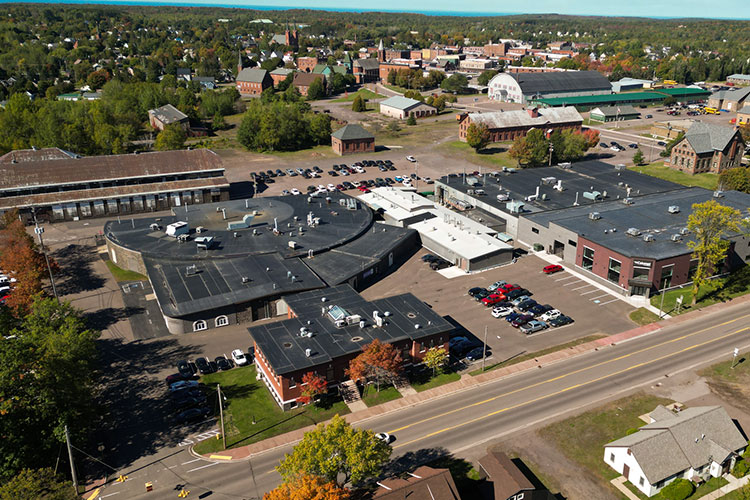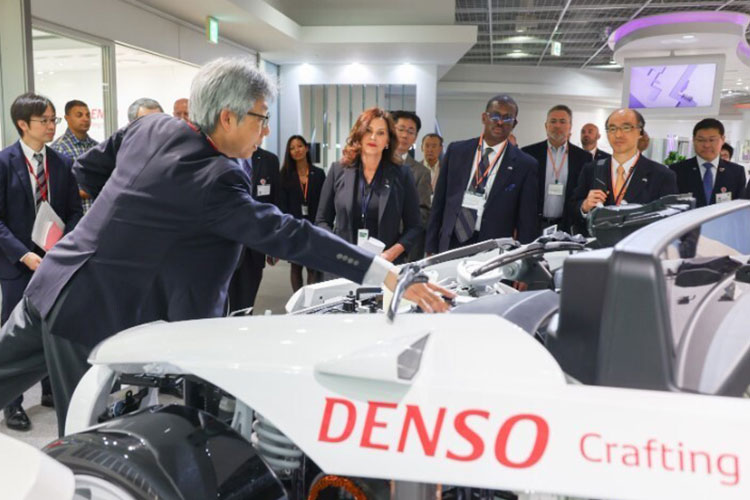
Economic Development Projects Creating or Retaining Nearly 400 Jobs Across the State
Tuesday, October 24, 2023
Calumet Electronics to construct first-and-largest-of-its-kind in U.S. facility for organic substrate manufacturing, retaining 270 jobs. | Support for DENSO will expand production line to include Battery Electric Vehicle-compatible components in Battle Creek | MSU College of Human Medicine expanding with Flint campus, adding 129 jobs to downtown
LANSING, Mich. – Today, Governor Gretchen Whitmer joined the Michigan Economic Development Corporation today in announcing Michigan Strategic Fund approval of a range of projects underscoring the state’s innovation in high-tech manufacturing and clean-tech leadership.
“Today’s investments will help Michigan lead the future of high-tech manufacturing and sustainability while growing and diversifying our economy,” said Governor Whitmer. “Together, we will keep getting things done to build on our economic momentum and deliver on the priorities that make a real difference in people’s lives so anyone can ‘make it’ in Michigan.”
Calumet Electronics solidifies Michigan’s semiconductor future with first Package Substrate manufacturing facility in the United States 
Calumet Electronics (Calumet) specializes in the engineering and manufacturing of high-quality Printed Circuit Boards (PCBs) and pioneering Packaged Substrates critical to the semiconductor ecosystem for aerospace and defense. In collaboration with customers and suppliers, Calumet has become an award-winning American owned and operated company, known for its thought leadership and innovative approach to engineering and manufacturing processes.
As one of the industry’s leading manufacturers, Calumet is committed to closing the U.S. technology gap with Asia while supporting and growing its local economy with advancing people into great careers in Michigan’s rural Upper Peninsula.
Calumet’s workforce consists of approximately 350 employees, and continues to hire, across its 160,000 sq. ft. campus located in Calumet, Michigan. The company is working to expand its operation in response to a need from the Department of Defense (DoD) to produce leap-ahead electronics in the United States.
Calumet’s emerging capability will enable next-generation DoD technology in multifunction applications including advanced radar, communications, high speed computing, and artificial intelligence, made possible by advanced packaging of semiconductors. Calumet seeks to stand up a first-of-its-kind package substrate factory in the United States, starting with a new 60,000 sq. ft. manufacturing facility within its existing campus.
The project is expected to generate a total capital investment of up to $50.98 million. Over the next three years, while the company scales its substrate production with training and technology, 270 of the employees will be retained to maintain the standard current production needs. Forty existing employees will receive initial upskilling critical to manufacturing advanced package substrates and highly complex PCB technologies in support of the semiconductor ecosystem and defense complex. The MSF board approved support through a $7.5 million Michigan Business Development Program grant and a 15-year, 100-percent State Essential Services Assessment Exemption with an estimated value of up to $758,877 for its $32,613,252 eligible investment in Eligible Personal Property.
“We extend our gratitude to Governor Whitmer, MEDC CEO Quentin L. Messer, his dedicated team for their tireless effort and unwavering support, and the Michigan Strategic Fund. Additionally, we thank InvestUP, Warner, Norcross & Judd and Marketing Department, Inc. for helping bring this project over the finish line,” said Calumet Electronics President Stephen Vairo. “The funding will allow Calumet Electronics to advance our technology with a primary focus on bringing semiconductor and microelectronics manufacturing back to the United States. We are thrilled about the prospect of expanding our operations and facilities right here in Calumet, MI, creating increased opportunities for career retention, upskilling, and job growth in the Copper Country.”
Calumet Electronics is a key partner in the MEDC’s Semiconductor Talent Action Team and has a proven track record of prioritizing talent attraction, development, and retention to support the next generation of manufacturing in the state of Michigan. This is in conjunction with Michigan Technological University, who graduates the brilliant engineers that power Calumet’s innovation.
Calumet is actively pursuing federal funding to address the needs of the Defense Industrial Base and support the strategic semiconductor and defense goals of the State of Michigan. In response to concerns raised by U.S. defense and commercial OEMs regarding the availability of package substrates produced within the United States, Calumet Electronics may become the primary supplier, potentially even an exclusive supplier to U.S. strategic programs.
This project aligns with Calumet's long-term strategic plan to become a global leader in producing next-generation technologies. Calumet's series of successes in producing substrates for advanced packaging, which have passed rigorous customer field testing, underscore the need for the company to prioritize capacity expansion. As a small business, Calumet is committed to making a substantial impact as an all-American Michigan manufacturer in the domestic semiconductor industry, contributing to national defense and bolstering U.S. economic competitiveness, all from the Upper Peninsula of Michigan.
Information on careers with Calumet Electronics can be found at https://www.calumetelectronics.com/greatpeople/
Global mobility supplier DENSO to retool Battle Creek facility’s production lines continue to secure automotive industry’s electrification transition efforts in Michigan 
DENSO’s thermal manufacturing facility in Battle Creek, Michigan, established in 1984 as the company’s first North American production location, is a vital element of DENSO’s thermal product business in the region. It produces a range of automotive heating and cooling technologies, such as air conditioning and engine cooling components and systems. Its campus comprises more than 1,380,000 square feet of manufacturing, warehouse and administrative floor space in six buildings on over 100 acres of land.
DENSO plans to transform its manufacturing operations and evolve its product offerings as the automotive industry continues to introduce more electrified vehicles, including Battery Electric Vehicles (BEVs). The investment will assist the retooling of production lines to accommodate product offerings that support vehicle electrification, including a line dedicated to providing BEV-compatible products to an OEM who is expanding BEV production in North America.
This project will be housed within the Battle Creek campus and preserve DENSO’s customer base in North America while protecting jobs in Battle Creek, and help the existing workforce transition their skills with the changing needs of the industry. This investment also positions DENSO as an ideal candidate for future investment in mobility and electrification.
The project is expected to generate a total capital investment of up to $63,000,000 with MSF approval of a 15-year, 100-percent SESA Exemption with an estimated value of up to $1,433,250 for its $63,000,000 eligible investment in Eligible Personal Property.
“We thank the state of Michigan and Governor Whitmer for their support as we continue to transform for greener, safer mobility,” said Andy Clemence, a senior vice president at DENSO and leader of the Green Business Group. “This investment represents another important step in that process, enabling our team to meet customers’ evolving needs, upskill on the latest manufacturing approaches and contribute to an eco-friendly future for all.”
This investment by DENSO was secured, and announced, during Governor Whitmer’s investment mission to Japan in September.
DENSO has more than 4,000 employees at several locations across the state, including its North American headquarters and technical center in Southfield. More than 2,100 employees are based at the thermal facility in Battle Creek.
DENSO is also an active member on the MEDC’s Talent Action Team. In the collaboration, the company has partnered with the state to develop and pilot the Michiganders Scholar’s program to enhance the talent pipeline for the EV transition and to upskill those already in the workforce. DENSO will also continue to work with the state of Michigan and other community partners on issues that help make southwest Michigan a desirable place to live and work, including workforce development, childcare and housing access.
MSU College of Human Medicine Department of Public Health Expansion at Flint Campus to become newest addition to Flint Health & Wellness District 
Uptown Reinvestment Corporation, which supports existing businesses and encourages entrepreneurial business development in the downtown Flint business district, had its latest project approved by the MSF board.
The MSU College of Human Medicine (CHM) Department of Public Health Expansion at Flint Campus will be part of the Flint Health & Wellness District. In 2013, the MSF supported the district project with a $5.6 million performance-based equity investment to redevelop four city blocks in downtown Flint to create an emerging health and wellness district, including a new urban plaza, relocation of the Flint Farmer’s Market, and a new MSU Flint Public Health & Medical Campus. The expansion approved today will build upon the success of the district, providing health services to the Flint community.
“The full impact of this project will be more than the physical structure. In partnership with MSU to expand their Charles Stewart Mott Foundation Department of Public Health, the building was intentionally designed to offer the community a seat at the table – inviting residents into a dialogue about public health concerns and solutions in Flint,” said Tim Herman, President of Uptown Reinvestment Corporation.
The project will be supported by a $3.4 million MSF performance-based grant, which will be used to construct a new three-story facility with spaces for research, administration and instruction in downtown Flint. MSU anticipates the project will create 129 additional jobs at the Flint location through 2028.
“The people of Flint and the faculty of Michigan State University College of Human Medicine have a deep, successful partnership that brings major funding into the community, providing hundreds of jobs for initiatives that improve the health of our people,” said Aron Sousa, MD, dean, MSU College of Human Medicine. “This building project will allow us all to do more of this important and valuable work.”
The Flint Campus will build on the CHM’s work as the leading public health institution on the Flint Water Crisis; MSU also plans to expand its current public health research at the new campus to include domestic violence and suicide prevention.
Rehabilitation of vacant multifamily building will add affordable housing to Detroit’s Piety Hill neighborhood 
The MSF board also approved a project from developer Century Partners that will rehabilitate a vacant multifamily building located in Detroit just south of the historic Boston Edison neighborhood, transforming a functionally obsolete property into 42 mixed-income residential units.
The Clairmount Apartments LLC project is being supported by a $1.5 million Michigan Community Revitalization Program (MCRP) Grant and will preserve affordability in the neighborhood near the Woodward corridor. In addition, the City of Detroit Brownfield Redevelopment Authority received MSF approval of $204,269 in state tax capture for the reimbursement of brownfield activities at the site.
Century Partners was founded in 2014 by Andrew Colom and David Alade, who have largely focused on residential assets with high impact and value-added investment in Detroit neighborhoods.
“The Detroit Economic Growth Corporation and City of Detroit are pleased to support Century Partners’ redevelopment of the Claire. This vacant and architecturally notable apartment building will be transformed into modern apartments with industry-leading amenities priced at rents needed in Detroit,” said Brian Vosburg, Director of Brownfield Redevelopment at the DEGC. “The City is supporting this project with a Neighborhood Enterprise Zone abatement, Brownfield TIF, and a Local Brownfield Revolving Fund grant and loan. The revival of the Claire adds momentum to the ongoing revitalization along the historic Woodward corridor, joining numerous neighborhood projects that are breathing new life into the area.”
The City of Detroit is supporting the project with a Neighborhood Enterprise Zone tax Abatement with an anticipated value of $1,400,680 over 15 years and the local portion of the Brownfield TIF valued at $256,981. The project is also being financed in part through LISC’s Detroit Housing for the Future Fund which is a fund raised in partnership with the City of Detroit and designed to support the creation of affordable housing units across the city.
In today’s meeting, the MSF board also approved the refunding of current outstanding bonds from 2014, whose proceeds were used by the MSF to fund the community share of the construction of the Facility for Rare Isotope Beams, a national user facility for nuclear science on MSU’s campus.
“The projects approved today represent Team Michigan’s commitment to retaining our storied manufacturing heritage in the most technologically advanced sectors, including mobility, semiconductors, and providing support to our nation’s defense,” said MEDC CEO and MSF President and Chair Quentin L. Messer, Jr. “Today’s projects also aim to develop, rehabilitate, and enhance our vibrant and diverse places, including our urban centers. We thank Governor Whitmer, legislators from both parties, the MSF board and local officials for their continued support of the our work as we look at help more friends and neighbors Make It in Michigan.”
Other local voices in support of today’s projects:
Calumet Electronics
“The U.P. remains incredibly hot with significant investment and development with the investment being made to transform business at Calumet Electronics,” said Marty Fittante, CEO of InvestUP. “That transformation is only possible because of the continued leadership and commitment of Governor Whitmer, MEDC CEO Quentin Messer, his team, and the Michigan Strategic Fund, all of whom continue to express through their determined efforts an appreciation that the U.P. is a catalyst in helping the state prosper. The Calumet Electronics story is remarkable as the company was founded as the answer to sustain the local economy to the exodus that was taking place when the copper mines were being shut down. Not only has this semiconductor company sustained the local economy, but since it was founded 55 years ago it has also grown to literally be Michigan’s Secret Weapon. Through this investment from the State, the company will grow further into a key component of our national security by ensuring the foundational backbone of sophisticated electronic systems are made right here at home.”
DENSO
“DENSO’s latest announced investment into its Battle Creek facility is significant in many ways,” said Joe Sobieralski, President & CEO, Battle Creek Unlimited. “It underscores DENSO’s ongoing commitment to the Battle Creek community during a historic shift within the automotive industry. This investment also speaks to DENSO’s commitment to work with the State of Michigan and the local community, along with our local and regional workforce partners to upskill existing employees which will keep jobs right here in Battle Creek. BCU has been building relationships with DENSO since 1976. Over the past five decades, the company has become Battle Creek’s largest employer. This new announcement will position DENSO to continue to grow in Battle Creek for years to come. We thank DENSO for this investment, and for their continued confidence in the Battle Creek community.”
Clairmount Apartments
“Century Partners is thrilled to deliver 42 units of high quality and economically attainable residential housing to the neighborhoods of Detroit, steps away from their first project in 2014,” said David Alade of Century Partners. “The Claire development will offer studios to 3-bedrooms units and deliver desperately needed housing to the residents of the Piety Hill neighborhood, equipped with modern amenities, energy efficient appliances, ADA compliant accessibility and environmentally sustainable heating and cooling infrastructure. This type of high quality and environmentally forward development would not be possible without critical funding and support from the MEDC and City of Detroit. We are thankful for the partnership and expect to commence the building’s restoration this year.”
About Michigan Economic Development Corporation (MEDC)
The Michigan Economic Development Corporation is the state’s marketing arm and lead advocate for business development, job awareness and community development with the focus on growing Michigan’s economy. For more information on the MEDC and our initiatives, visit www.MichiganBusiness.org. For Pure Michigan® tourism information, your trip begins at www.michigan.org. Join the conversation on: Facebook Instagram LinkedIn, and Twitter.
Recent Press Releases